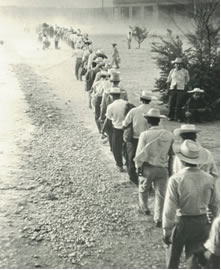The Debate Over Guest-Worker Programs
Background

Workers in the Bracero
program in Oregon, circa 1942.
(National Archives)
Currently, foreign workers may obtain temporary visas that allow them to work in the United States as "guest workers." In 2004, President George W. Bush proposed legislation that would expand the guest-worker program to include undocumented immigrants already living in the United States. In the new program, employers would have to try to find American workers before employing guest workers. The president intended the program to be a part of comprehensive immigration reform, but such reform did not happen. Many people-both in and out of government-still support some kind of expanded guest-worker program.
An Overview of the Controversy
Some critics of the program believe that a guest-worker program would decrease wages for domestic and foreign-born American workers. They also argue that the program would exploit the labor of millions of undocumented workers in the United States. They cite a previous guest-worker program, the Bracero program (1942-1964), in which Mexican farm workers were underpaid and housed in substandard conditions. Other critics believe that a guest-worker program legitimizes unauthorized immigration. Supporters of the program, however, argue that it is fair to undocumented foreign workers, offering them a chance to contribute to and benefit from the U.S. economy without fear of deportation. They also claim that guest workers could freely travel to and from their home countries with temporary legal status.
Controversy in Focus: The Signal International Workers
On June 11, 2008, a dozen workers from India ended a four-week hunger strike in which they camped out in a park across from the Indian Embassy in Washington, D.C. They were trying to bring to light abuse they allegedly suffered after Signal International, a U.S. employer, hired them with the promise of permanent residency status. Instead, they became guest workers with temporary work visas. They allege that they were housed in substandard conditions while earning reduced wages in Mississippi. In early 2010, they filed a civil rights lawsuit against Signal International. Critics say the treatment of these workers shows how a guest-worker program would be rife with exploitation.


